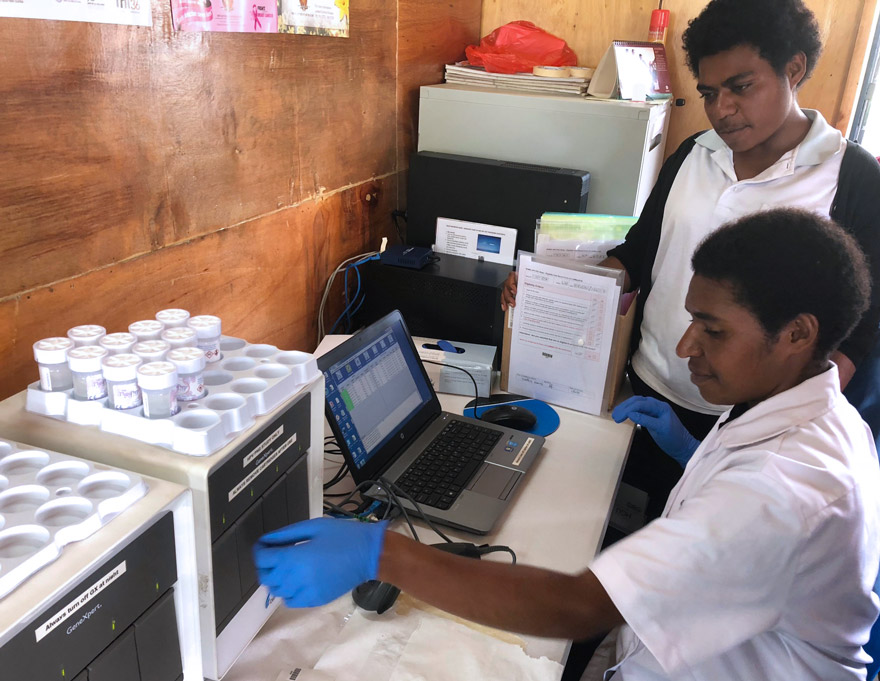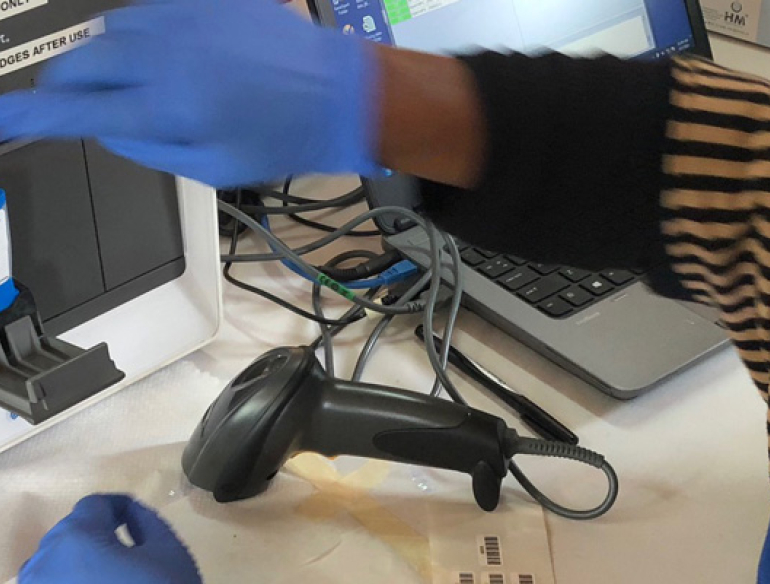Researchers from the Kirby Institute at UNSW Sydney have been awarded $1.59 million from the federal government for new research advancing the elimination of cervical cancer in rural Papua New Guinea.
Written by Yolande Hutchison for the UNSW Newsroom
Professor Andrew Vallely from the Kirby Institute at UNSW Sydney will lead a project on human papillomavirus (HPV) testing and treatment for the elimination of cervical cancer in rural and remote Papua New Guinea.
Funding for the project is part of a $5.9 million investment announced by Minister for Health Greg Hunt last week for cancer prevention among women in vulnerable communities across the world through the Global Alliance for Chronic Diseases (GACD).
The project builds on an initiative announced earlier in the year by the Kirby Institute to co-lead a new cervical cancer elimination program in the Western Pacific.
Prof. Vallely said: “In our earlier field trials in Papua New Guinea, we developed a new ‘test and treat’ screening model. It comprised HPV testing of self-collected vaginal specimens followed by same-day treatment using a new battery operated, portable thermal ablation device. This proved highly effective, acceptable and cost-effective.”
“Building on these findings we will now establish how best to reach women in rural and remote communities, where cervical pre-cancer and cancer rates are highest, access to health services most constrained, and the majority of women at risk in PNG and other high-burden, low-resource countries live.”
 PNGIMR and Kirby Institute collaborative research team training clinical staff in Mount Hagen, PNG on point-of-care HPV-DNA testing.
PNGIMR and Kirby Institute collaborative research team training clinical staff in Mount Hagen, PNG on point-of-care HPV-DNA testing.
The new project involves partners* from the Papua New Guinea Institute of Medical Research; the NHMRC Centre for Research Excellence in Cervical Cancer Control: Kirby Institute, Cancer Council NSW and VCS Foundation, Royal Women’s Hospital, Melbourne; and health authorities in Western Highlands Province and Madang, Papua New Guinea.
Professor William Pomat, Director of the Papua New Guinea Institute of Medical Research and a lead investigator on the grant said: “This award builds on more than a decade of collaborative research on cervical screening and cancer prevention in PNG led by the PNG Institute of Medical Research and the Kirby Institute at UNSW. I am delighted that we now have an opportunity to continue to drive the elimination agenda forward together with partners in PNG and Australia, and to obtain the critical evidence required to ensure no woman in PNG is left behind.”
Professor Karen Canfell, Director of the Daffodil Centre, a joint venture between Cancer Council NSW and the University of Sydney, welcomed the new award. “We are thrilled to be part of this new project that will complement the work we are doing together to advance cervical cancer elimination in our region,” Prof. Canfell said.
Professor Marion Saville, Executive Director, VCS Foundation said: "We are absolutely delighted Minister Hunt has approved this funding for HPV testing and treatment for cervical cancer elimination in Papua New Guinea.
“Developing a locally appropriate cancer screening registry is crucial in scaling up cervical screening programs in low and middle-income countries such as PNG. VCS Foundation’s canSCREEN e-health platform will be optimised for PNG local health care teams to record and track women’s results and follow-up care.”
Australia, through the NHMRC, is a founding member of the GACD, the first international collaboration of major research funding agencies that specifically addresses chronic non-communicable diseases in low- and middle-income countries (LMICs) and in vulnerable communities in high-income countries (HICs).
* Investigators on the grant:
Kirby Institute: Professor Andrew Vallely (CIA), Professor Rebecca Guy, Professor John Kaldor, Associate Professor Angela Kelly-Hanku, Professor Matthew Law, Dr Steven Badman, Dr Michaela Riddell, Dr Lisa Vallely
Papua New Guinea Institute of Medical Research: Professor William Pomat (CIB), Dr Pamela Toliman, Ms Josephine Gabuzzi, Dr John Bolnga
Cancer Council NSW: Professor Karen Canfell (CIC), Dr Kate Simms
VCS Foundation: Professor Marion Saville (CID), Associate Professor Julia Brotherton.
University of Papua New Guinea: Professor Glen Mola
Royal Women’s Hospital Melbourne: Prof Suzanne Garland
JHPIEGO: Dr Chris Morgan
About C4
The Centre for Research Excellence in Cervical Cancer Control (C4) is funded by the National Health and Medical Research Council (NHMRC), Australia’s leading research funding body.
C4 brings together Australia’s leaders in cervical cancer control, in both HPV vaccination and cervical screening, with researchers from Cancer Council NSW, VCS Foundation, Kirby Institute at UNSW Sydney, the University of Melbourne and Family Planning NSW. The prior work of C4 investigators has underpinned Australia’s major innovations in public health in terms of the successful delivery of HPV vaccination in girls and boys and the implementation of an HPV-based cervical screening program.
About the Eliminate Cervical Cancer in the Western Pacific program
The Eliminate Cervical Cancer in the Western Pacific program (ECCWP) is co-led by Professor Karen Canfell at Cancer Council NSW; Professor Andrew Vallely, from the Kirby Institute and PNG Institute of Medical Research; Professor Marion Saville at VCS Foundation; and Professor Deborah Bateson at Family Planning NSW; on behalf of C4 and in close collaboration with in-country partners and stakeholders.
ECCWP is taking place in Papua New Guinea and Vanuatu and will advance the WHO strategy to eliminate cervical cancer as a public health problem globally, based on a ‘triple-intervention’ approach that sets out simple targets to place all countries on the path toward elimination by 2030: the so-called ’90-70-90’ targets – 90% of girls fully vaccinated against human papillomavirus by age 15; 70% of women screened by age 35 years, and again by age 45 years, using a high-precision test for human papillomavirus; 90% of women with cervical pre-cancer and invasive disease managed appropriately and effectively.
